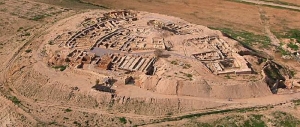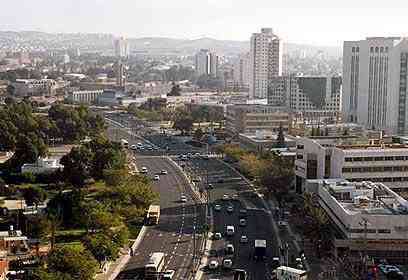To•lᵊd•otꞋ 3rd Eve

Greco-Philistines Threaten A Range War Against Yi•tzᵊkhâqꞋ
The Greco-Philistines Plug-up The Wells Avᵊrâ•hâmꞋ Had Dug
 Tel Haror 400x300.jpg) |
| Gᵊrâr ("lodging"), modern Tel Ha•rorꞋ in the NëgꞋëv of Yi•sᵊr•â•eilꞋ near the ancient Hellenist Greco-Minoan Philistine (modern Gaza) border. |
Yi•tzᵊkhâqꞋ prospered in Gᵊrâr, and he continued prospering, until he became exceedingly prosperous. He amassed tzon and cattle and many employees. So-o-o-o…
The Hellenist Philistines became envious of him. They began a series of attacks, plugging his wells to cut off his water supply and force Yi•tzᵊkhâqꞋ to move his herds and flocks out of Philistine lands. They even plugged up the wells that Avᵊrâ•hâmꞋ had dug in the area, private wells inherited by, and owned by Yi•tzᵊkhâqꞋ — including Bᵊeir ShëvꞋa.
Neither man nor beast can survive without water. So this series of attacks threatened his life, the lives of his family and all of his employees as well as the lives of all of his herds and flocks. This aggression by the Philistines threatened to break out into an all-out range war. Finally, Avi-mëlꞋëkh told Yi•tzᵊkhâqꞋ, "Get out of Gᵊrâr! You've become too powerful; you are a threat to us."
 habsor co il 300x200.jpg) |
Though Yi•tzᵊkhâqꞋ and his family, along with his extensive herds, flocks and employees were expelled from Gᵊrâr, davꞋqâ, he set up his main camp just outside the village, in the adjacent NaꞋkhal Gᵊrar. Drawing a clear red line, and in a calculated strategy of warning deliberately designed to Avi-mëlꞋëkh's chagrin, Yi•tzᵊkhâqꞋ and his family — along with his local corps of men, herds and flocks — settled there!
Yi•tzᵊkhâqꞋ Re-Digs His Father's Wells
Being a man of foresight and forethought, Yi•tzᵊkhâqꞋ realized that the scarcity of water in the area failed to provide sufficient water for all of the combined flocks and herds of both the Philistines and his own. This had been the primary bone of contention with his Greco-Philistine neighbors. Since Yi•tzᵊkhâqꞋ had learned to find water and dig wells from his father, he was perfectly positioned with the opportunity to form a new company: Yi•tzᵊkhâqꞋ's Water-Finding & Well-Digging Services.
Yi•tzᵊkhâqꞋ had his men re-dig all of the wells that his father, Avᵊrâ•hâmꞋ, had dug and called the wells by the same name his father had given them. So now, not only did Yi•tzᵊkhâqꞋ have plenty of water for all of his people, flocks and herds throughout his land, he had also produced a trained engineering corps that was well experienced and successful in finding water and digging wells.
To advertise his services, Yi•tzᵊkhâqꞋ and his men dug a new bᵊeir right next door to Avi-mëlꞋëkh and the Greco-Philistines — in NaꞋkhal Gᵊrar!!!
The Greco-Philistine shepherds immediately flocked to Yi•tzᵊkhâqꞋ's new bᵊeir and hitᵊa•sᵊq•uꞋ (haggled) with him to buy water rights to water their flocks and herds. So Yi•tzᵊkhâqꞋ named the bᵊeir "Bᵊeir EiꞋsëq" ("Haggler's Well").
But that left Yi•tzᵊkhâqꞋ and his people with not enough water to water all of his own people, flocks and herds. So, Yi•tzᵊkhâqꞋ's Water-Finding & Well-Digging Services dug yet another bᵊeir. Still, there wasn't enough water for everyone and the Philistines quarreled over this bᵊeir too. So Yi•tzᵊkhâqꞋ named this bᵊeir "Bᵊeir Si•tᵊn•âhꞋ."
Although his water-finding and well-digging business was booming, Yi•tzᵊkhâqꞋ's primary interest was his herds and flocks, not digging wells to benefit foreigners. Moreover, the Philistines had proven themselves greedy beyond any hope of amicable reconciliation. So Yi•tzᵊkhâqꞋ set his sights on bolstering his water sources eastward, away from the Greco-Philistines, where he dug yet another bᵊeir. This bᵊeir was uncontested by the Greco-Philistines. So Yi•tzᵊkhâqꞋ named this place RᵊkhōvꞋōt, saying, "For now ä' hi•rᵊkhivꞋ for us and we may be fruitful in hâ-ÂrꞋëtz."
Yi•tzᵊkhâqꞋ Returns Home To Bᵊeir ShëvꞋa
 |
After establishing his bᵊeir and range rights to the land in RᵊkhōvꞋōt, Yi•tzᵊkhâqꞋ moved back to his central homestead in Bᵊeir ShëvꞋa.
That night, Yi•tzᵊkhâqꞋ envisioned ä' telling him, "I'm the Ël•oh•imꞋ of Avᵊrâ•hâmꞋ your father. Don't be terrified because I'm with you. I will bless you and increase you seed for the sake of Avᵊrâ•hâmꞋ, My worker."
So there, in Bᵊeir ShëvꞋa, Yi•tzᵊkhâqꞋ built a mi•zᵊbeiꞋakh, invoked the Name ä', pitched his tent and his workers dug another bᵊeir.
Greco-Philistines Propose A Peace Treaty With Yi•tzᵊkhâqꞋ
Meanwhile, Yi•tzᵊkhâqꞋ's visit north to RᵊkhōvꞋōt, near the Khit•imꞋ, apparently aroused fears that he might have visited the area in order to garner a military coalition with the Khit•imꞋ to invade Philistia.
Yi•tzᵊkhâqꞋ seems to have been the regional kingmaker in the buffer zone between Greco-Philistia and the Khit•imꞋ. When siding with the Khit•imꞋ, they were stronger than the Greco-Philistines. However, when Yi•tzᵊkhâqꞋ sided with the Greco-Philistines, then they appeared to have the upper hand against the Khit•imꞋ. Thus, Yi•tzᵊkhâqꞋ was able to keep each in check — and out of his own territory in their buffer zone.
Consequently, Avi-mëlꞋëkh, clearly feeling threatened by Yi•tzᵊkhâqꞋ's visit nearby the Khit•imꞋ, assembled a delegation, including Phi•kholꞋ, his military Chief of Staff, and went to meet Yi•tzᵊkhâqꞋ in Bᵊeir ShëvꞋa.
Yi•tzᵊkhâqꞋ said to them, "Why have you come to me? You eschewed me and sent me away from you."
"But we've absolutely seen that ä' was with you," the Philistine delegation entreated defensively. "So we said, 'May there be an oath carrying an imprecation between ourselves, between us and you — if you do wrongly with us when we haven't touched you and when we did only good with you, sending you away in peace — so may we cut a bᵊrit with you. Now it's up to you to also swear with an imprecation. Bâ•rukhꞋ ä'.' "
So Yi•tzᵊkhâqꞋ put on a banquet and they ate and drank.
The next morning, they awoke and swore the oath carrying an imprecation, man-to-brother. Then Yi•tzᵊkhâqꞋ saw them off. So the Philistines left him in peace.
 |
| Modern Bᵊeir ShëvꞋa |
That same day, Yi•tzᵊkhâqꞋ's workers came to him and related to him concerning their prospecting at another bᵊeir they'd been digging there. "We've found water!" they exclaimed excitedly. So Yi•tzᵊkhâqꞋ called it Bᵊeir Shiv•âhꞋ, affirming the swearing, echoing the name of the earlier bᵊeir in the city and, thereby, corroborating the name of the city to this day: Bᵊeir ShëvꞋa !

Optional parental preparation:
- What does davꞋqâ mean?
- What's a mi•zᵊbeiꞋakh?
- What is an oath that carries an imprecation? (E.g., swearing that, "if you or I do 'x' then may we go blind"; or that "if you or I don't do 'y' then may we go blind." I.e., the phrase "then may we go blind" (may he turn into a frog, die a horrible death or burn in hell) is the imprecation to come upon whomever breaks the oath (x or y) that they are swearing.
Questions you might anticipate that your child might raise and be prepared to discuss:
- What is a range war? (a war between ranchers over grazing range and water rights)
- What does chagrin mean?
- What does the phrase "bone of contention" mean? (picture a pride of lions contending over a bone)
- What does entreat mean?
- What does garner mean?
- What is a coalition?
- What does corroborate mean?
Google+ registered author & publisher

